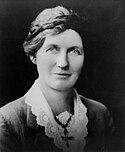Lyttelton by-election, 1933
|
|
||||||||||||||||
|---|---|---|---|---|---|---|---|---|---|---|---|---|---|---|---|---|
|
||||||||||||||||
|
The Lyttelton seat in the House of Representatives. Election by simple majority using first-past-the-post voting. |
||||||||||||||||
| Turnout | 74.98% | |||||||||||||||
|
||||||||||||||||
|
||||||||||||||||
The Lyttelton by-election of 1933 was a by-election held during the 24th New Zealand Parliament in the Christchurch electorate of Lyttelton. It is notable for being won by Elizabeth McCombs of the New Zealand Labour Party, who became the first woman to be elected to the New Zealand Parliament. This by-election was therefore seen as a milestone in Women's suffrage in New Zealand.
This by-election came about because of the death of James McCombs who was Elizabeth McCombs's husband. He had held the electorate of Lyttelton since he won it in the Lyttelton by-election of 1913. He was therefore one of the earliest members of the Labour party to hold an electorate. He died of a heart attack on 2 August 1933.
Despite the electorate of Lyttelton being held by Labour or its predecessor the Social Democrats since 1913, the electorate was seen as marginal as it had been won by just 32 votes at the general election of 1931. However, the Labour Party were confident of retaining the electorate as they pledged reforms that would help those affected by the Great Depression. The Labour party chose to select Elizabeth McCombs who had previously been elected to the Christchurch City Council in 1921 and had stood for Labour in Kaiapoi and then Christchurch North in the 1928 and the 1931 respectively. McCombs was unanimously selected as the Labour party candidate. Nine other women had stood for parliament in New Zealand since they had been allowed to in 1919, while women gained the right to vote in 1893. It was not uncommon for family members to take over parliamentary electorates upon the death of a family member. For example, Vincent Ward had taken over from his father Joseph in the Invercargill electorate in 1930.
...
Wikipedia


